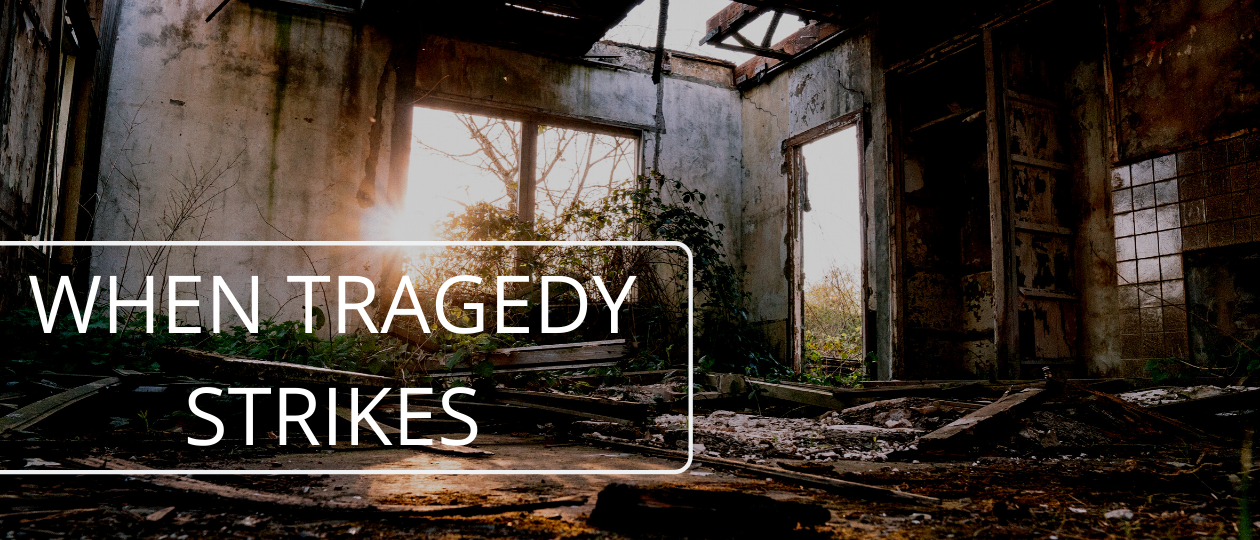When tragedy strikes
If you haven’t experienced it for yourself, then I’m sure you’ve seen in procedural cop shows when someone gets pulled out of a bad wreck or a burning building or something, and they seem kind of unresponsive even though they’re physically okay. The cop or EMT will ask them some basic questions, maybe shine a light in their eyes before reporting, “He’s in shock.” Basically, a sudden trauma has overwhelmed them so much that they just shut down for a while, mentally and emotionally. What’s more, even though they’re already out of physical danger, the shock itself can be dangerous if not properly treated. In fact, untreated shock can commonly be fatal!
I think that the aftermath of a tragedy can be very similar. As usual, when we’re comparing an emotional trauma to a physical one, the harm is less obvious and takes longer to manifest. But that doesn’t make it less dangerous.
Statistics say that on average, a person will experience between 5 and 15 events in their life that rise to the level of a “tragedy.” Naturally, that figure will be a little lower for some people and a lot higher for others. Of course, the classic example of tragedy is the death of someone close to us, and every one of us will have to deal with this at some point, provided we live long enough. I lost my mother to cancer at a young age. I remember that even though I didn’t want to lose her, I truly thought I was ready for her death. We were on good terms; we’d had time to say goodbye and to talk about every subject you could imagine.
But I was wrong. When she finally passed it hit me hard in a way I couldn’t possibly have known or prepared for. I guess the lesson is that some things will always be a shock, no matter how much you prepare for them. So what can you do to be ready?
First let’s take a look at the physical process of shock. It progresses through up to four stages. In the aptly named initial stage, you’re basically in fight-or-flight mode. Your blood pressure spikes, long-term energy sinks like digestion and immune activity are turned off or down, and you become far more sensitive to fear-signals. This is probably the stage you think of when you think of the word “shock.”
The second stage is called the compensatory stage, and if all goes well it will be the last. In this stage blood, pressure should normalize as your body attempts to reach homeostasis—basically, that means returning to stability. Your body “compensates” for whatever trauma sent you into shock in the first place, and you return to normal. Unless, of course, you don’t…
The third stage is called the progressive stage, meaning that for whatever reason, your body has failed to compensate for the trauma, and you are progressing toward the fourth, final stage. This one is called the irreversible stage because once you hit that point many people never return to normal. Although I should say I absolutely do not believe it is truly irreversible. I’ve known a number of people who reached that stage and were able to return to normal, although it is definitely harder, and requires different tools.
But even though no preparation can take the shock out of a tragedy, you can make preparations that will help you to recover and move on afterward. Naturally, it’s much better to learn these things before the need arises.
One small thing that can make a really big difference is breathing techniques. Focusing on breath is something you see a lot after a physical shock too, for good reason. My favorite method is called the 6/9/12. You just slowly draw in a breath over six seconds, then hold it in for nine seconds, and then slowly exhale over twelve seconds. That’s all there is to it, and this method has the enormous advantage of stimulating your vagus nerve to place your body in a state of physiological peace. This is a really wonderful way of grounding yourself that also has the advantage of being very physically heathy as well.
Another good thing to keep in mind is a time frame. When you’ve been through a tragedy—losing a loved one for example—a mourning period is normal and even healthy… as long as it ends. There’s no one right time frame I can give since it will be different for different people and different circumstances, but after a certain number of weeks or months, if you find yourself unable to move on, then it may be time to find help. Just as with physiological shock, these things become much harder to deal with if left untreated.
The good news is that even the worst tragedy can be a source of good for the future—even though it never feels like it at the time. When my wife Hope kicked me out of the house many years ago, it felt like my life was over! But it was exactly what I needed to grow into the person I needed to be, and I remember it today as one of the most positive events of my life. On several occasions, I’ve asked the crowd at one of my events to raise their hands if they’ve ever had a similar experience, where something tragic in their life ended up being exactly what they needed. To this day, I can recall maybe two or three people out of all those crowds that left their hands down.
It’s important to remember these things.
Have a blessed, wonderful day!
Alex Loyd




Add a Comment